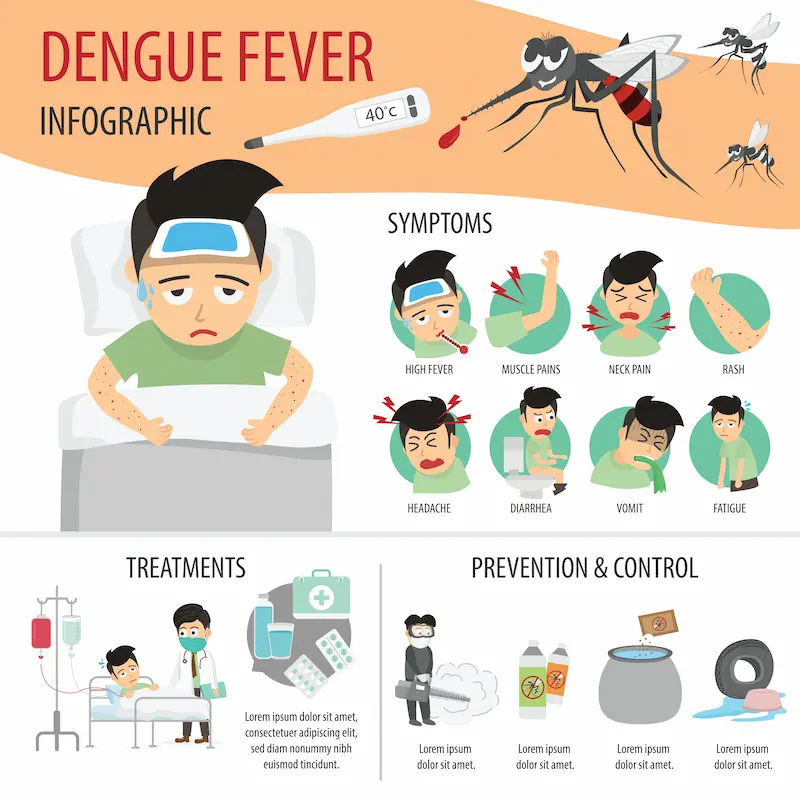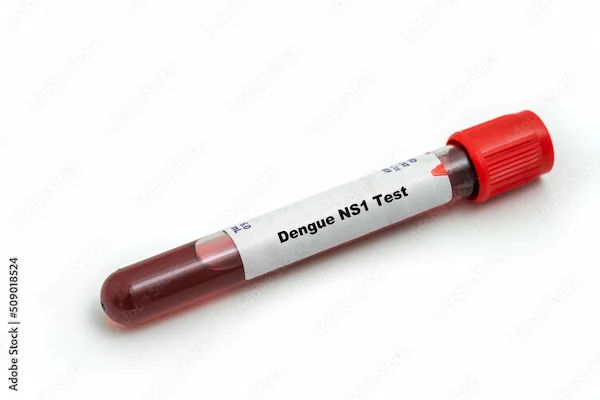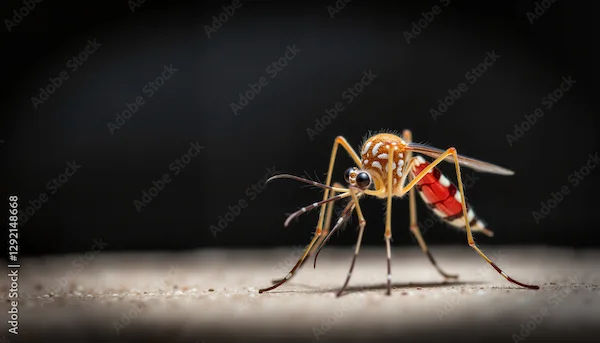Dengue Fever: A Complete Guide to Symptoms, Treatment, and Prevention
Learn everything about dengue fever: symptoms, warning signs, treatment options, home care tips, and prevention strategies to protect yourself and your family.

Written by Dr. Md Yusuf Shareef
Reviewed by Dr. Dhankecha Mayank Dineshbhai MBBS
Last updated on 13th Jan, 2026

Introduction
Dengue fever is a mosquito-borne viral infection that poses a significant health threat in tropical and subtropical regions, affecting millions each year. Caused by the dengue virus and spread primarily by the Aedes aegypti mosquito, it can range from a mild flu-like illness to a severe, potentially life-threatening condition. Understanding this disease is your first line of defence. This comprehensive guide will walk you through everything you need to know—from identifying the earliest signs and understanding the critical warning phases to effective home care strategies and proven prevention methods. Whether you're seeking information for preparedness or are currently navigating an infection, this article provides a clear, actionable plan to tackle dengue fever head-on, emphasising when to seek professional medical help for a safe recovery.
What Exactly is Dengue Fever?
Dengue fever is not a bacterial infection that can be treated with antibiotics. It is a viral illness caused by one of four closely related virus serotypes (DENV-1, DENV-2, DENV-3, and DENV-4). This fact is crucial because infection with one serotype provides lifelong immunity only to that specific one. Subsequent infections with different serotypes can increase the risk of developing severe dengue.
The Dengue Virus and Its Strains
The four dengue virus serotypes belong to the Flaviviridae family. Recovery from infection by one provides robust immunity against that serotype but only partial and temporary protection against the others. This complex immune response is why a person can get dengue fever more than once, and unfortunately, subsequent infections are often more severe.
How Dengue Spreads: The Role of the Aedes Mosquito
Dengue cannot spread directly from person to person. The primary transmission cycle involves humans and mosquitoes. An Aedes mosquito (primarily Aedes aegypti) bites a person infected with the dengue virus. The virus then multiplies inside the mosquito for 8-12 days. After this incubation period, the mosquito can transmit the virus to other healthy individuals for the rest of its life through its bites. These mosquitoes are distinctive day-biters, most active during early morning and late afternoon, and they typically breed in clean, stagnant water found in urban settings—like in flower pots, water tanks, and discarded tires.
Consult a General Practitioner for the best advice
Recognising the Signs: Dengue Fever Symptoms
Symptoms usually appear 4-10 days after being bitten by an infected mosquito and can last for 2-7 days. The presentation often occurs in two distinct phases.
The First Phase: Classic Dengue Fever
The onset is usually sudden with high fever (104°F or 40°C). Other common symptoms of dengue in adults and children include:
• Severe headache, particularly behind the eyes.
• Intense muscle, bone, and joint pain, which is why it's sometimes called "breakbone fever."
• Nausea and vomiting.
• Pain behind the eyes (retro-orbital pain).
• Swollen glands.
• A characteristic skin rash that may appear a few days after the fever starts.
The Critical Phase: Warning Signs of Severe Dengue
As the fever subsides (typically after 3-7 days), some individuals may enter a critical phase. This is when severe dengue warning signs can develop, indicating the infection is becoming life-threatening. It is essential to seek immediate medical attention if any of the following appear:
• Severe abdominal pain or persistent vomiting.
• Bleeding from the nose or gums, or blood in vomit or stool.
• Rapid breathing, restlessness, or fatigue.
• A sudden drop in platelet count can lead to complications.
How is Dengue Fever Diagnosed?
Because its early symptoms mimic other illnesses like flu or chikungunya, a proper medical diagnosis is vital.
When to See a Doctor
You should consult a doctor if you develop a high fever within two weeks of being in a dengue-prone area. If your condition does not improve after trying basic fever management methods, or if any warning signs appear, seek help immediately. For timely consultation, you can connect with a specialist online through Apollo24|7 without delay.
Common Diagnostic Tests
Doctors confirm dengue using blood tests. The two main types are:
1. NS1 Antigen Test: This test detects the presence of the dengue virus itself (the NS1 protein) and is most effective within the first 5 days of illness.
2. Antibody Tests (IgM and IgG): These tests look for antibodies your immune system produces to fight the infection. IgM antibodies appear first, while IgG antibodies appear later and can indicate a past infection. Apollo24|7 offers convenient home collection for tests like these, ensuring you can get diagnosed safely and quickly.
Get Your Health Assessed
A Step-by-Step Guide to Dengue Treatment and Recovery
There is no specific antiviral cure for dengue. Treatment focuses on relieving symptoms, careful monitoring, and preventing complications.
Medical Management: What to Expect
In a hospital, treatment for severe cases involves supportive care, such as intravenous (IV) fluid replacement to maintain electrolyte balance and, in critical situations, platelet transfusion. The key is close monitoring of vital signs, haematocrit, and platelet counts.
Home Care Strategies for Dengue Fever
For mild cases, doctors will advise home management. Here’s your action plan:
The #1 Rule: Stay Hydrated
High fever and vomiting can lead to severe dehydration. Drink plenty of fluids—water, oral rehydration solutions (ORS), coconut water, and fresh juices. Proper hydration helps maintain blood volume and is critical for recovery.
Managing Fever and Pain Safely
Use paracetamol (acetaminophen) to reduce fever and alleviate pain. It is crucial to avoid medications like aspirin, ibuprofen, and other non-steroidal anti-inflammatory drugs (NSAIDs), as they can increase the risk of bleeding.
The Best Diet for Dengue Recovery
Focus on a light, easy-to-digest diet for dengue recovery. Papaya leaf extract is popularly believed to help increase platelet count, though conclusive scientific evidence is limited. Nutrient-rich foods like soups, porridge, fruits (kiwi, papaya), and vegetables are recommended. The most important dietary advice is to stay hydrated and eat small, frequent meals.
Preventing Dengue Fever: Your Best Defence
Prevention is undoubtedly better than cure. Since dengue spreads through mosquitoes, control focuses on eliminating them.
Mosquito Control: Stop the Breeding
The Aedes mosquito breeds in clean, stagnant water. Regularly check and empty water from coolers, pots, plant saucers, buckets, and discarded containers. Cover all water tanks and storage containers properly.
Personal Protection: Avoid Bites
Use mosquito repellents on exposed skin and clothing. Wear long-sleeved shirts and long pants, especially during the day. Use mosquito nets while sleeping, even during the day naps. Install screens on windows and doors to keep mosquitoes out.
Life After Dengue: Understanding Post-Viral Fatigue
Recovery doesn't always end when the fever breaks. Many people experience profound fatigue, weakness, and a general feeling of being unwell for several weeks after the acute illness. This post-dengue fatigue is normal. It's essential to get plenty of rest, maintain a nutritious diet, and gradually return to your normal activities. If extreme tiredness persists beyond a month, consult a doctor online with Apollo24|7 for further evaluation and guidance on managing post-viral syndrome.
Conclusion
Tackling dengue fever effectively requires a combination of vigilance, knowledge, and prompt action. By understanding the symptoms, especially the critical warning signs, you can seek timely medical care to prevent severe complications. Remember, management revolves around supportive care—primarily staying hydrated and getting ample rest. However, the most powerful tool against dengue is prevention. By actively eliminating mosquito breeding sites around our homes and protecting ourselves from bites, we can collectively reduce the spread of this disease. If you or a loved one experiences symptoms, do not hesitate to seek professional medical advice. Staying informed and prepared is the key to safeguarding your health against dengue fever.
Consult a General Practitioner for the best advice
Consult a General Practitioner for the best advice

Dr. Rajesh R
General Practitioner
24 Years • MBBS
Bengaluru
Maruti Polyclinic and dental care, Bengaluru

Dr Aswathy D C
General Practitioner
6 Years • MBBS
Bangalore
Apollo Clinic Bellandur, Bangalore
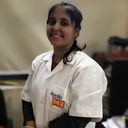
Dr. Ashita Kuruvilla
General Physician/ Internal Medicine Specialist
7 Years • MBBS
East Midnapore
VIVEKANANDA SEBA SADAN, East Midnapore
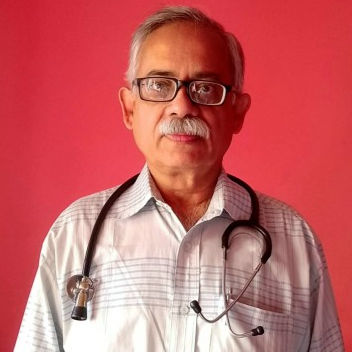
Dr. Pinaki Mukhopadhyay
General Physician/ Internal Medicine Specialist
32 Years • MBBS
Kolkata
MCR SUPER SPECIALITY POLY CLINIC & PATHOLOGY, Kolkata
(25+ Patients)
Dr. Srilekhya
Internal Medicine Specialist Diabetologist
10 Years • MBBS, MD (GENERAL MEDICINE)
Bengaluru
Apollo Medical Center, Marathahalli, Bengaluru
Consult a General Practitioner for the best advice

Dr. Rajesh R
General Practitioner
24 Years • MBBS
Bengaluru
Maruti Polyclinic and dental care, Bengaluru

Dr Aswathy D C
General Practitioner
6 Years • MBBS
Bangalore
Apollo Clinic Bellandur, Bangalore

Dr. Ashita Kuruvilla
General Physician/ Internal Medicine Specialist
7 Years • MBBS
East Midnapore
VIVEKANANDA SEBA SADAN, East Midnapore

Dr. Pinaki Mukhopadhyay
General Physician/ Internal Medicine Specialist
32 Years • MBBS
Kolkata
MCR SUPER SPECIALITY POLY CLINIC & PATHOLOGY, Kolkata
(25+ Patients)
Dr. Srilekhya
Internal Medicine Specialist Diabetologist
10 Years • MBBS, MD (GENERAL MEDICINE)
Bengaluru
Apollo Medical Center, Marathahalli, Bengaluru
More articles from Dengue
Frequently Asked Questions
1. Can you get dengue twice?
Yes, you can. There are four different dengue virus serotypes. Infection with one provides immunity only to that type, leaving you vulnerable to infection by the other three.
2. What is a dangerous platelet count in dengue?
A normal platelet count ranges from 150,000 to 450,000 platelets per microlitre of blood. A count below 100,000 is a concern, and a rapid drop below 20,000 significantly increases the risk of serious bleeding and may require a transfusion. However, the trend of the drop is as important as the absolute number.
3. What foods should be avoided in dengue?
Avoid oily, spicy, and processed foods that are hard to digest. It's also best to avoid caffeinated and alcoholic beverages as they can contribute to dehydration.
4. How long does dengue fever last?
The acute febrile phase typically lasts 2-7 days. The recovery phase, including fatigue, can last for several weeks.
5. Is there a vaccine for dengue?
A vaccine exists (Qdenga) and is approved in several countries, but its use depends on local regulations and is often recommended for individuals with a confirmed prior dengue infection. It is not universally available or recommended for everyone.
